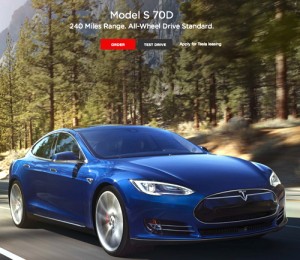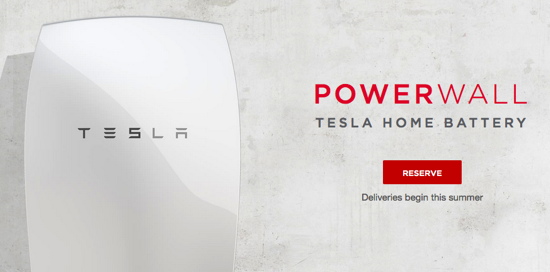Search “Tesla” online and you’ll most likely find, first, the amazing electric car company by that name [link]. Makes sense. On a recent trip to Chicago, I saw the car first-hand and kept saying to myself, “Fantastic! Fantastic!” Now, given that I am by nature a car guy, that may not be all that surprising. But the more one digs into Tesla Motors, the more impressed one becomes. In Chicago, I happily noted that the infrastructure for recharging these vehicles seems to be on the rise. The key numbers for the company are on the rise too.
Earlier this month, Daniel Sparks (@danielsparks) gave a glowing update on Tesla Motors (@teslamotors) on the pages of The Motley Fool, a site for investors [link]. Acknowledged to be an investor in Tesla, Sparks reported:
Tesla’s first-quarter non-GAAP revenue and EPS were $1.1 billion and a $0.36 loss, ahead of a consensus analyst estimate for $1.04 billion and a $0.50 loss, respectively. …
The electric-carmaker had already announced quarterly deliveries of about 10,000, up 56 per cent from the year-ago quarter and easily exceeding its guidance for 9,500 deliveries. …
One of the key takeaways from the results was the level of sales growth Tesla is reporting. The company’s revenue and delivery growth rates are actually accelerating. …
This accelerating growth is especially clear when examining the company’s year-over-year growth rates in vehicle deliveries. The company’s 56 per cent year-over-year growth in Model S deliveries is the highest rate achieved since quarters in 2013, the first full year of Model S sales.
 Yet, if you go to the Tesla website and read a recent press release [link], it is interesting that this is how the page concludes: “Tesla is not just an automaker, but also a technology and design company with a focus on energy innovation.”
Yet, if you go to the Tesla website and read a recent press release [link], it is interesting that this is how the page concludes: “Tesla is not just an automaker, but also a technology and design company with a focus on energy innovation.”
And that is why, in your online search for Tesla, you will also find links to stories reporting that Tesla is moving rapidly into becoming a battery company, but not for cars; they’re building batteries for homes [link]! Robert Montenegro (@Monteneggroll) on the “bigthink” website has one of the best reports on this new aspect of Tesla: “Tesla’s Worst-Kept Secret Has Become Power Companies’ Worst Nightmare” [link]. You can also find a video here that shows Tesla founder and CEO Elon Musk talking about Powerwall, the jumbo batteries that could truly be a competitive problems for companies that sell electricity.
Elon Musk (@elonmusk) is one interesting fellow [link], and researching him will also lead you to his venture in launching rockets via the company SpaceX [link]. (But that’s a whole other blog post — but, if you’re interested, start here with Ashlee Vance’s in-depth look at how SpaceX almost brought down Tesla Motors [link].)
What I find in my conversations with others about either Musk or Tesla is the repeated question, “Is Tesla a car company or a battery company?”
Wrong question. The real question is how Musk is both making repeated headlines and growing multiple businesses.
Musk excels at framing “big problems” and then getting a lot of smart people engergised (pun intented) around solving them. The work on a sustainable electric car business has eluded many of the big global automakers who, until quite recently, really did not seem to be taking the ultimate demise of oil-based ground transportation seriously. Then, too, the monopoly of power utilities and the problems around nuclear energy seemed to eclipse the general problem of delivering and storing energy globally, without the embedded base of endless electric cables running through cities and neighborhoods. Musk challenged two different sets of engineers to tackle those two problems.
And what’s even more interesting is that — for cars and for electricity — one only had to ask “what’s next?” to get moving in new directions. To be sure, the work on “the future of energy distribution” combines both divergent thinking and convergent thinking — the latter allowing for the framing and delivery of a product that solves a real problem, a step that not all dreamers are able to make but which is crucial for innovation and progress. And Musk (who started Tesla Motors a dozen years ago) did not allow himself to become trapped by unreasonable expectations and by undoable deadlines.
Musk’s focus seems to be more about a competitive product that would happen in the long run (electric car, power storage unit), and he was willing to be patient as his companies slowly but surely changed the rules of the game. Rejecting the permanence of internal-combustion, gas-hogging cars and aspiring to get normal households off the electric utility grid are transformational innovations that will shape the the planet, not just Tesla.
Elon Musk has a lot of admirers right now, and to be fair, a few critics, too. Yet, those of us who admire Musk cannot sit back and wait for a few ambitious thinkers to reshape our own world. We must do it every day and in every way within our own enterprises. Nextsensing is everyone´s job in one way or another, and leaders must frame and shape how it is going to work in their organisations sooner rather than later.

